- Home
- Mitch Albom
The Time Keeper
The Time Keeper Read online
Also by Mitch Albom
Have a Little Faith
For One More Day
The Five People You Meet in Heaven
Tuesdays with Morrie
Fab Five
Bo
DEDICATION
This book, about time, is dedicated to Janine,
who makes every minute of life worthwhile.
CONTENTS
Also by Mitch Albom
Title Page
Dedication
Prologue
Chapter 1
Beginning
Chapter 2
Chapter 3
Chapter 4
Chapter 5
Chapter 6
Chapter 7
Chapter 8
Chapter 9
Chapter 10
Chapter 11
Chapter 12
Chapter 13
Chapter 14
Chapter 15
Chapter 16
Cave
Chapter 17
Chapter 18
Chapter 19
Chapter 20
Chapter 21
Chapter 22
Chapter 23
The In-Between
Chapter 24
Chapter 25
Chapter 26
Chapter 27
Chapter 28
Falling
Chapter 29
Chapter 30
Chapter 31
Chapter 32
Earth
Chapter 33
Chapter 34
Chapter 35
Chapter 36
Chapter 37
Chapter 38
Chapter 39
City
Chapter 40
Chapter 41
Chapter 42
Chapter 43
Chapter 44
Chapter 45
Chapter 46
Chapter 47
Chapter 48
Chapter 49
Chapter 50
Chapter 51
Chapter 52
Chapter 53
Chapter 54
Letting Go
Chapter 55
Chapter 56
Chapter 57
Chapter 58
Chapter 59
New Year’s Eve
Chapter 60
Chapter 61
Chapter 62
Chapter 63
Stillness
Chapter 64
Chapter 65
Chapter 66
Chapter 67
Chapter 68
Chapter 69
Future
Chapter 70
Chapter 71
Chapter 72
Chapter 73
Chapter 74
Chapter 75
Chapter 76
Chapter 77
Chapter 78
Chapter 79
Epilogue
Chapter 80
Chapter 81
Acknowledgments
About the Author
Copyright
PROLOGUE
1
A man sits alone in a cave.
His hair is long. His beard reaches his knees. He holds his chin in the cup of his hands.
He closes his eyes.
He is listening to something. Voices. Endless voices. They rise from a pool in the corner of the cave.
They are the voices of people on Earth.
They want one thing only.
Time.
Sarah Lemon is one of those voices.
A teenager in our day, she sprawls on a bed and studies a photo on her cell phone: a good-looking boy with coffee-colored hair.
Tonight she will see him. Tonight at eight-thirty. She recites it excitedly—Eight-thirty, eight-thirty!—and she wonders what to wear. The black jeans? The sleeveless top? No. She hates her arms. Not the sleeveless.
“I need more time,” she says.
Victor Delamonte is one of those voices.
A wealthy man in his mid-eighties, he sits in a doctor’s office. His wife sits beside him. White paper covers an exam table.
The doctor speaks softly. “There’s not much we can do,” he says. Months of treatment have not worked. The tumors. The kidneys.
Victor’s wife tries to speak, but the words catch. As if sharing the same larynx, Victor clears his throat.
“What Grace wants to ask is … how much time do I have left?”
His words—and Sarah’s words—drift up to the faraway cave, and the lonesome, bearded man sitting inside it. This man is Father Time.
You might think him a myth, a cartoon from a New Year’s card—ancient, haggard, clutching an hourglass, older than anyone on the planet.
But Father Time is real. And, in truth, he cannot age. Beneath the unruly beard and cascading hair—signs of life, not death—his body is lean, his skin unwrinkled, immune to the very thing he lords over.
Once, before he angered God, he was just another man, fated to die when his days were done.
Now he has a different fate: Banished to this cave, he must listen to the world’s every plea—for more minutes, more hours, more years, more time.
He has been here an eternity. He has given up hope. But a clock ticks for all of us, silently, somewhere. And one is ticking even for him.
Soon Father Time will be free.
To return to Earth.
And finish what he started.
BEGINNING
2
This is a story about the meaning of time
and it begins long ago, at the dawn of man’s history, with a barefoot boy running up a hillside. Ahead of him is a barefoot girl. He is trying to catch her. This is often the way it is between girls and boys.
For these two, it is the way it will always be.
The boy’s name is Dor. The girl is Alli.
At this age, they are nearly the same size, with high-pitched voices and thick, dark hair, their faces splashed with mud.
As Alli runs, she looks back at Dor and grins. What she feels are the first stirrings of love. She scoops a small rock and tosses it high in his direction.
“Dor!” she yells.
Dor, as he runs, is counting his breaths.
He is the first person on Earth to attempt this—counting, making numbers. He began by matching one finger to another, giving each pairing a sound and a value. Soon he was counting anything he could.
Dor is gentle, an obedient child, but his mind goes deeper than those around him. He is different.
And on this early page of man’s story, one different child can change the world.
Which is why God is watching him.
“Dor!” Alli yells.
He looks up and smiles—he always smiles at Alli—and the stone falls at his feet. He cocks his head and forms a thought.
“Throw another!”
Alli throws it high. Dor counts his fingers, a sound for one, a sound for two—
“Ahrrgunph!”
He is tackled from behind by a third child, Nim, a boy much larger and stronger. Nim crows as he puts a knee in Dor’s back.
“I am king!”
All three children laugh.
They resume their running.
Try to imagine a life without timekeeping.
You probably can’t. You know the month, the year, the day of the week. There is a clock on your wall or the dashboard of your car. You have a schedule, a calendar, a time for dinner or a movie.
Yet all around you, timekeeping is ignored. Birds are not late. A dog does not check its watch. Deer do not fret over passing birthdays.
Man alone measures time.
Man alone chimes the hour.
And, because of this, man alone suffers a paralyzing fear that no other creature endures.
A fear of time running out.
3
Sarah Lemon fears time is running out.
She steps from the shower and calculates. Twenty minutes to blow-dry her hair, half hour for makeup, half hour to dress, fifteen minutes to get there. Eight-thirty, eight-thirty!
The bedroom door opens. Her mother, Lorraine.
“Honey?”
“Knock, Mom!”
“OK. Knock-knock.”
Lorraine eyes the bed. She sees options laid out: two pairs of jeans, three T-shirts, a white sweater.
“Where are you going?”
“Nowhere.”
“Are you meeting someone?”
“No.”
“You look good in the white—”
“Mom!”
Lorraine sighs. She lifts a wet towel from the floor and leaves.
Sarah returns to the mirror. She thinks about the boy. She pinches the fat around her waist. Ugh.
Eight-thirty, eight-thirty!
She is definitely not wearing the white.
Victor Delamonte fears time is running out.
He and Grace step from the elevator into their penthouse. “Give me your coat,” Grace says. She hangs it in the closet.
It is quiet. Victor uses a cane to move down the hallway, past the large oil painting by a French master. His abdomen is throbbing. He should take a pill. He enters his study, filled with books and plaques and a huge mahogany desk.
Victor thinks about the doctor. There’s not much we can do. What does that mean? Months? Weeks? Is this the end of him? This can’t be the end of him.
He hears Grace’s heels pacing on the tile floor. He hears her dial the phone. “Ruth, it’s me,” she says. Ruth, her sister.
Grace lowers her voice. “We just came from the doctor …”
Alone in his chair, Victor does the math of his dwindling life. He feels a breath shoot from his chest, as if someone choked it out. His face contorts. His eyes moisten.
4
As children grow, they gravitate to their fates.
So did Dor, Nim, and Alli, the three children on that hillside.
Nim became tall and broad-shouldered.
He carried mud bricks for his father, a builder. He liked that he was stronger than other boys. Power became Nim’s fascination.
Alli grew more beautiful
and her mother warned her to keep her dark hair braided and her eyes lowered, lest her fairness encourage the bad desires of men. Humility became Alli’s cocoon.
Dor?
Well. Dor became a measurer of things. He marked stones, he notched sticks, he laid out twigs, pebbles, anything he could count. He often fell into a dreamy state, thinking about numbers, and his older brothers left him behind when they went hunting.
Instead, Dor ran up the hills with Alli, and his mind raced ahead of him, beckoning him to follow.
And then, one hot morning, a strange thing happened.
Dor, now a teen by our years, sat in the dirt and wedged a stick in the ground. The sun was strong and he noticed the stick’s shadow.
He placed a stone at the shadow’s tip. He sang to himself. He thought about Alli. They had been friends since they were children, but now he was taller and she was softer and he felt a weakness when her lowered eyes lifted up to meet his. He felt as if he were being tipped over.
A fly buzzed past, interrupting his daydream. “Ahhhh,” he said, swatting it away. When he glanced back at the stick, its shadow no longer reached the stone.
Dor waited, but the shadow grew even smaller, because the sun was moving up in the sky. He decided to leave everything in place and return tomorrow. And tomorrow, when the sun cast a shadow exactly to the stone, that moment would be … the same moment as today.
In fact, he reasoned, wouldn’t every day contain one such moment? When the shadow, stick, and stone aligned?
He would call it Alli’s moment, and he would think of her each day at that juncture.
He tapped his forehead, proud of himself.
And thus did man begin to mark time.
The fly returned.
Dor swatted it again. Only this time it stretched into a long, black strip, which opened into a pocket of darkness.
Out stepped an old man in a draped white robe.
Dor’s eyes widened in fear. He tried to run, to scream, but nothing in his body responded.
The old man held a staff of golden wood. He poked Dor’s sun stick and it rose from the dirt and turned into a string of wasps. The wasps created a new line of darkness, which opened like a pulled curtain.
The old man stepped through it.
And he was gone.
Dor ran away.
He never told anyone about that visit.
Not even Alli.
Not until the end.
5
Sarah finds time in a drawer.
She opens it looking for her black jeans and instead discovers, buried near the back, her first watch—a purple Swatch model with a plastic band. Her parents gave it to her for her twelfth birthday.
Two months later, they divorced.
“Sarah!” her mother yells from downstairs.
“What?” she yells back.
After the split, Sarah stayed with Lorraine, who would blame Tom, her absent ex, for every wrong thing in their lives. Sarah would nod sympathetically. But each of them, in a way, was still waiting on the man; Lorraine to admit he was wrong, Sarah to have him rescue her. Neither thing happened.
“What, Mom?” Sarah yells again.
“Do you need the car?”
“I don’t need the car.”
“What?”
“I don’t need the car!”
“Where are you going?”
“Nowhere!”
Sarah checks the purple watch, which still runs: it is 6:59 P.M.
Eight-thirty, eight-thirty!
She closes the drawer and yells, “Focus!”
Where are her black jeans?
Victor finds time in a drawer.
He takes out his calendar book. He sees the next day’s itinerary, which includes a 10 A.M. board meeting, a 2 P.M. conference call with analysts, and an 8 P.M. dinner with a Brazilian CEO whose company Victor is buying. The way he feels, he’ll be lucky to get through one of those.
He swallows a pill. He hears a buzzer. Who is coming at this hour? He hears Grace walking down the hall. He sees their wedding picture on his desk, the two of them so young, so healthy, no tumors, no failing kidneys.
“Victor?”
She is at the study door with a man from a service company, who pushes a large electric wheelchair.
“What’s this?” Victor says.
Grace forces a smile. “We decided, remember?”
“I don’t need it yet.”
“Victor.”
“I don’t need it!”
Grace looks to the ceiling.
“Just leave it,” she tells the service man.
“In the hallway,” Victor instructs.
“In the hallway,” Grace repeats.
She follows the man out.
Victor closes the calendar and rubs his abdomen. He thinks about what the doctor said.
There’s not much we can do.
He has to do something.
6
Dor and Alli were married.
They stood at an altar on a warm autumn night. Gifts were exchanged. Alli wore a veil. Dor poured perfume over her head and declared, “She is my wife. I will fill her lap with silver and gold.” This was how it was done in their day.
Dor felt a warm, calming feeling when he said those words—She is my wife—because ever since they were children she was like the sky to him, forever around. Only Alli could distract him from his counting. Only Alli could bring him water from the great river and sit beside him and hum a sweet melody, and he would sip from the cup and not even realize how long he had been staring.
Now they were married. It made him happy. That night he observed a quarter moon t
hrough the clouds, and he used it to mark the moment, the light of the night they were wed.
Dor and Alli had three children.
A son, then a daughter, then another daughter. They lived with Dor’s family in his father’s house, near three other houses made of wattle and daub. Families lived together in their time—parents, children, and grandchildren—all under one roof. Only if a son acquired wealth would he move to a house of his own.
Dor would never acquire wealth.
He would never fill Alli’s lap with silver and gold. All the goats, sheep, and oxen belonged to his brothers or his father, who often swatted Dor for wasting his time with silly measures. His mother cried when she saw him hunched over his work. She felt the gods had left him feeble.
“Why could you not be more like Nim?” she asked.
Nim had become a powerful king.
He had great riches and many slaves. He’d begun construction of a massive tower, and on certain mornings, Dor and Alli would walk past it with their children.

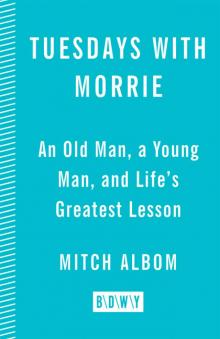 Tuesdays With Morrie
Tuesdays With Morrie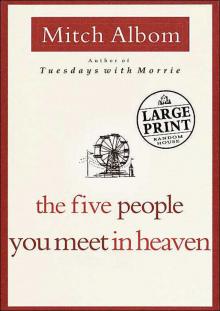 The Five People You Meet in Heaven
The Five People You Meet in Heaven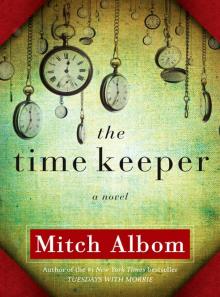 The Time Keeper
The Time Keeper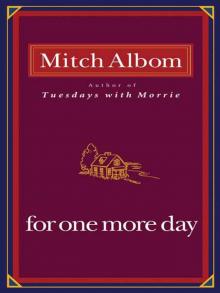 For One More Day
For One More Day The First Phone Call From Heaven: A Novel
The First Phone Call From Heaven: A Novel The Magic Strings of Frankie Presto
The Magic Strings of Frankie Presto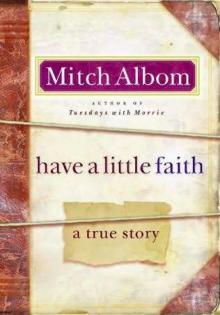 Have a Little Faith: A True Story
Have a Little Faith: A True Story The Next Person You Meet in Heaven
The Next Person You Meet in Heaven Tuesdays with Morrie: an old man, a young man, and life’s greatest lesson
Tuesdays with Morrie: an old man, a young man, and life’s greatest lesson Have a Little Faith
Have a Little Faith